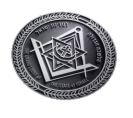What is Freemasonry?
Freemasonry is the world's oldest universal fraternity, which believes in the brotherhood of man under the Fatherhood of G-d. Freemasonry strives to achieve moral improvement, family values, civic betterment, freedom of thought, and tolerance. Freemasons around the world volunteer and contribute to medical research, hospitals, homes for the elderly, scholarships, and many other charitable causes.
Simply put, Freemasons believe that it is important to be a good person, and that good persons should encourage each other to become better persons, and then, regardless of economic resources, work together benevolently to help in the community. Based on these strong foundations of morality and conscience, it is not surprising that Freemasonry is the world's largest philanthropic institution, seeking to provide relief for suffering humanity.
Freemasonry is a fraternity, absolutely not a secret society. As such, it is open for membership applications and has modes of recognition. Freemasonry is definitely not a religious cult or political group; Freemasons do never discuss religion or politics. Yet, membership strictly requires belief in G-d. Furthermore, Freemasons are expected to be model citizens, faithful followers of their respective religions, and loyal patriots of their respective countries.
Who founded Freemasonry?
Freemasonry was a professional guild of Operative Masons (practical builders), or in simple words, kind of a construction craftsmen union. For many generations, the apprentices inherited from their master craftsmen many building practices and professional traditions, which are universal, and not the product of any one people or time. Freemasonry is the result of growth and development, in which many Freemasons had a part, and it has taken to itself many teachings, philosophies, systems of knowledge, and symbols.
Why Free Masons?
The craftsmen of the guild of Operative Masons were legally free to travel in foreign countries and work in various construction sites, as their profession required. Usually, they were not subject to the laws, rules, and taxes of any one country, king, or prince, who needed their practical professional skill, knowledge, and abilities.
Why Speculative?
Speculative Freemasonry is a descendant of the Operative Freemasonry. Speculative Freemasonry began with the practice of admitting to membership in Operative Lodges men who were not necessarily builders, but were interested in the moral, ethical, and philosophical teachings of the Masonic Fraternity. The Freemasonry of today does not involve practical construction of edifices, but it is a pursuit of moral knowledge.
What are the Ancient Landmarks?
Different Grand Lodges around the world have various lists of Ancient Landmarks and thus have given the tenets in the list the force of law in those Grand Lodges. Conceptually, Landmarks are fundamental laws, which no Grand Lodge can make or unmake, adopt or repeal. The Landmarks are unalterable by any individual or group. Every Freemason should ascertain what his own Grand Lodge has adopted (or not adopted) as Landmarks and govern himself accordingly.
Most Grand Lodges will agree that at least seven Masonic fundamentals are considered Landmarks:
Belief in God (monotheism) is the sole dogma of Freemasonry.
Immortality of the soul is the ultimate lesson of Masonic philosophy.
The Volume of the Sacred Law (Tanach, Bible, and/or Koran) is indispensable on the altar of a Lodge.
The legend of Hiram, involved in the construction of the Temple of Jerusalem (the first edifice built for G-d by Solomon, King of Israel).
The modes of recognition of the Fraternity.
Symbolism of the operative art by way of the professional construction tools.
A Freemason must be a freeborn male adult.
The grand lodge of the state of Israel
The Grand Lodge of the State of Israel was consecrated on October 20, 1953 at the Y.M.C.A. Hall in Jerusalem.
The first Masonic Lodge in the Holy Land was the Royal Solomon Mother Lodge No. 293, under the Grand Lodge of Canada in Ontario, whose first meeting was held in the King Solomon's Quarries of Jerusalem on May 7, 1873.
Before that, an occasional assembly of Masons performed a Secret Monitor ceremony in the same location on May 13, 1868.
TheJubileecelebration took place on October 20, 2003 in Tel Aviv.
Working days:
Every last Tuesday in months: January, March, June, September.
We hope this gives you a better understanding and an answer to Freemasonry Explained.
Any correspondence can be sent to:
|

 English (United Kingdom)
English (United Kingdom)  Hebrew
Hebrew  Russian (Russia)
Russian (Russia)  Español (España)
Español (España) 